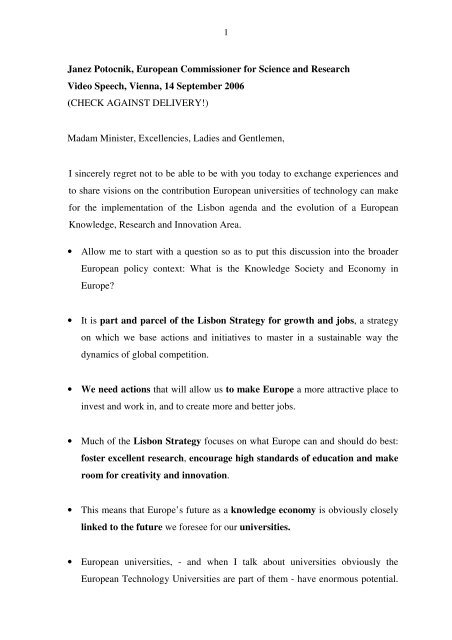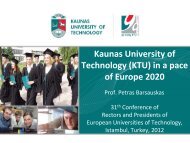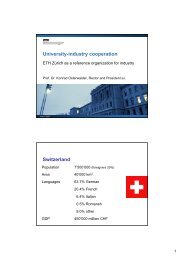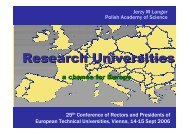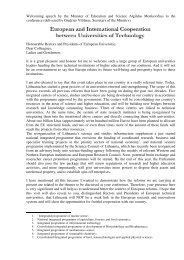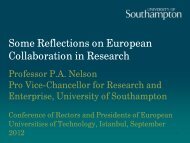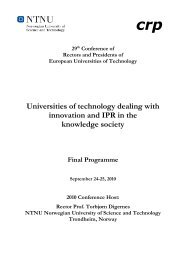The role of university research for the development of the knowledge ...
The role of university research for the development of the knowledge ...
The role of university research for the development of the knowledge ...
Create successful ePaper yourself
Turn your PDF publications into a flip-book with our unique Google optimized e-Paper software.
1<br />
Janez Potocnik, European Commissioner <strong>for</strong> Science and Research<br />
Video Speech, Vienna, 14 September 2006<br />
(CHECK AGAINST DELIVERY!)<br />
Madam Minister, Excellencies, Ladies and Gentlemen,<br />
I sincerely regret not to be able to be with you today to exchange experiences and<br />
to share visions on <strong>the</strong> contribution European universities <strong>of</strong> technology can make<br />
<strong>for</strong> <strong>the</strong> implementation <strong>of</strong> <strong>the</strong> Lisbon agenda and <strong>the</strong> evolution <strong>of</strong> a European<br />
Knowledge, Research and Innovation Area.<br />
• Allow me to start with a question so as to put this discussion into <strong>the</strong> broader<br />
European policy context: What is <strong>the</strong> Knowledge Society and Economy in<br />
Europe<br />
• It is part and parcel <strong>of</strong> <strong>the</strong> Lisbon Strategy <strong>for</strong> growth and jobs, a strategy<br />
on which we base actions and initiatives to master in a sustainable way <strong>the</strong><br />
dynamics <strong>of</strong> global competition.<br />
• We need actions that will allow us to make Europe a more attractive place to<br />
invest and work in, and to create more and better jobs.<br />
• Much <strong>of</strong> <strong>the</strong> Lisbon Strategy focuses on what Europe can and should do best:<br />
foster excellent <strong>research</strong>, encourage high standards <strong>of</strong> education and make<br />
room <strong>for</strong> creativity and innovation.<br />
• This means that Europe’s future as a <strong>knowledge</strong> economy is obviously closely<br />
linked to <strong>the</strong> future we <strong>for</strong>esee <strong>for</strong> our universities.<br />
• European universities, - and when I talk about universities obviously <strong>the</strong><br />
European Technology Universities are part <strong>of</strong> <strong>the</strong>m - have enormous potential.
2<br />
<strong>The</strong>y are <strong>the</strong> main sources <strong>of</strong> <strong>knowledge</strong> and <strong>knowledge</strong> is an increasingly<br />
critical factor in shaping European's economy.<br />
• But this potential goes untapped because <strong>of</strong> various stringencies and<br />
hindrances. If Europe wants to free up <strong>the</strong> substantial reservoir <strong>of</strong> <strong>knowledge</strong><br />
and talent immediate, in-depth and coordinated change is required: from <strong>the</strong><br />
way in which systems are regulated and managed, to <strong>the</strong> ways in which<br />
universities are governed and funded.<br />
• Following <strong>the</strong> European Council’s invitation at Hampton Court last November,<br />
<strong>the</strong> Commission has adopted in May a Communication to drive <strong>for</strong>ward<br />
<strong>the</strong> modernisation <strong>of</strong> Europe’s universities, to increase <strong>the</strong>ir contribution to<br />
Europe’s drive <strong>for</strong> more growth and more jobs.<br />
• This Communication is a joint initiative by myself and by Commissioner<br />
Figel. It covers all activities <strong>of</strong> Europe’s universities, from <strong>the</strong>ir delivery <strong>of</strong><br />
education and, <strong>the</strong>ir <strong>research</strong> activities, through to <strong>the</strong>ir potential as drivers <strong>of</strong><br />
innovation.<br />
• While <strong>the</strong> main actors are obviously situated at national and regional levels or<br />
in <strong>the</strong> universities <strong>the</strong>mselves, <strong>the</strong> EU’s <strong>role</strong> here is to complement national<br />
actions and rein<strong>for</strong>ce <strong>the</strong>m at European level.<br />
• <strong>The</strong> European Commission delivers on this <strong>role</strong>, both through its funding<br />
programmes and by giving policy impulses.<br />
• On funding programmes relevant <strong>for</strong> universities, I should <strong>of</strong> course mention<br />
<strong>the</strong> Seventh Framework Programme <strong>for</strong> <strong>research</strong> (FP7), and obviously <strong>the</strong> new<br />
series <strong>of</strong> Education Programmes and to a certain extent also <strong>the</strong><br />
Competitiveness and Innovation Programme, CIP.
3<br />
• <strong>The</strong> Structural Funds need to be explored by Member States and universities<br />
as possible funding sources developing closer synergies and interaction<br />
between education, <strong>research</strong> and innovation, and to build or consolidate<br />
<strong>research</strong> capacities at local and regional level.<br />
• As Commissioner <strong>for</strong> <strong>research</strong>, I would like to concentrate briefly on <strong>the</strong> next<br />
Framework Programme <strong>for</strong> <strong>research</strong>, FP7. From 2007 onwards we will be<br />
able to draw on a <strong>research</strong> budget that will grow substantially in <strong>the</strong> years to<br />
come.<br />
• Finalising <strong>the</strong> decisions on <strong>the</strong> necessary legislation and implementation<br />
modalities <strong>for</strong> FP7 is a priority, in order to be able to launch <strong>the</strong> first calls <strong>for</strong><br />
proposals still be<strong>for</strong>e <strong>the</strong> end <strong>of</strong> this year.<br />
• What makes FP7 so important is that in many ways it corrects market failures in<br />
<strong>research</strong> throughout Europe. As such it brings dynamism into regional and<br />
national <strong>research</strong> and it fosters and spreads excellence through competition at<br />
European level.<br />
• It also combats fragmentation and exerts a structuring influence on <strong>the</strong><br />
<strong>research</strong> fabric in Member States by stimulating trans-national cooperation.<br />
Pooling <strong>of</strong> competences and resources increases <strong>the</strong> likelihood <strong>of</strong><br />
breakthroughs. It is as simple as that.<br />
• <strong>The</strong> specific programmes and various instruments <strong>of</strong> <strong>the</strong> 7 th Framework<br />
Programme will <strong>the</strong>re<strong>for</strong>e enable and stimulate universities to streng<strong>the</strong>n <strong>the</strong>ir<br />
<strong>role</strong> in and <strong>the</strong>ir contribution to European <strong>research</strong>. At <strong>the</strong> same time it is<br />
designed to have a significant impact on <strong>the</strong> quality <strong>of</strong> <strong>research</strong> in<br />
universities.
4<br />
• Ladies and gentlemen, in my view <strong>research</strong> should be a key mission <strong>of</strong><br />
universities, both <strong>for</strong> <strong>knowledge</strong> production and <strong>for</strong> training purposes, as<br />
part <strong>of</strong> a coherent institutional strategy. <strong>The</strong> issue <strong>of</strong> how to respond<br />
effectively to <strong>the</strong> increasing complexity and pace <strong>of</strong> <strong>knowledge</strong> <strong>development</strong><br />
and application is crucial. Universities’ <strong>role</strong> in an increasingly “scientific” and<br />
“technological” society is essential.<br />
• One <strong>of</strong> <strong>the</strong> premises on which FP7 is based is that its success depends on its<br />
capacity to attract and reward <strong>the</strong> best <strong>university</strong>-based <strong>research</strong> and to<br />
mobilise universities behind achieving <strong>the</strong> general EU objectives <strong>of</strong> leveraging<br />
<strong>knowledge</strong> <strong>for</strong> growth in a European <strong>research</strong> area.<br />
• <strong>The</strong> more universities adopt a coherent approach to participation in FP7’s<br />
different activities, reflecting universities’ interests as corporate-like entities<br />
ra<strong>the</strong>r than organisations <strong>of</strong> loosely-connected <strong>research</strong> groups, <strong>the</strong> greater<br />
FP7’s leverage effect, and its benefits <strong>for</strong> universities, will be.<br />
• This implies strategic choices and <strong>the</strong> willingness to conduct internal<br />
re<strong>for</strong>ms. I am – however – convinced that <strong>the</strong>se will allow universities to make<br />
<strong>the</strong>ir full contribution to Europe’s social and economic goals, and come in<br />
support <strong>of</strong>, not in contradiction to <strong>the</strong> o<strong>the</strong>r <strong>role</strong>s <strong>of</strong> universities in a culturally<br />
and linguistically diverse Europe.


